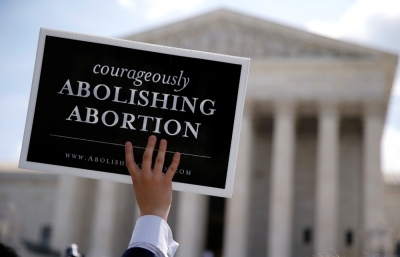Recent Polls Overstate Public Support for Roe v. Wade

Justice Kennedy's announcement that he is retiring from the U.S. Supreme Court has dramatically raised salience of sanctity-of-life issues. Supporters of legal abortion and their allies in the mainstream media are working tirelessly to generate opposition to a constitutionalist nominee who might vote to weaken or overturn the Roe v. Wade decision. One key talking point among many abortion-rights groups is that Roe is a decision that enjoys broad public support and should be considered settled. Indeed, a flurry of polls released in recent days by NBC News/Survey Monkey, Kaiser Family Foundation, and Quinnipiac University all purportedly find that over 60 percent of respondents support Roe v. Wade.
These polls are all misleading for several reasons. First, a significant number of Americans are unfamiliar with the Roe v. Wade decision. A Pew Research Center poll taken in 2013 found that only 62 percent of respondents were aware that Roe v. Wade dealt with abortion. Seventeen percent thought Roe v. Wade dealt with some other public-policy issue and 20 percent were unfamiliar with the decision. Furthermore, even many who realize Roe v. Wade dealt with abortion fail to understand the full implications of the decision. Many wrongly think that overturning Roe v. Wadewould result in national ban on abortion, instead a reversal of Roe would return the issue to the states.
Additionally, many polling questions, including the recent questions by NBC News/Survey Monkey, the Kaiser Family Foundation, and Quinnipiac University all fail to inform respondents that Roe v. Wade effectively legalized abortion on demand for all nine months of pregnancy and makes it difficult to place limits on late-term abortions. Historically, there has been very little public support for second-trimester or third-trimester abortions. For instance, a Gallup poll that was released this June found that only 28 percent of people thought second-trimester abortions should be legal and only 13 percent thought third-trimester abortions should be legal.
In 2006, Crisis Magazine published a useful article by Mark Stricherz, which analyzed polling on Roe v. Wade. He looks at the polls conducted during the Supreme Court confirmation hearings of John Roberts and Samuel Alito in the mid 2000s. A Gallup poll at this time described Roe v. Wade as the decision that "legalized abortion" giving respondents the incorrect impression that abortion was always illegal beforehand. The Pew Research Center survey described Roe v. Wade as having "established a woman's constitutional right to an abortion, at least in the first three months of pregnancy." Both the Gallup and the Pew Research Center found that support for Roe v. Wade was over 60 percent. However, when the Los Angeles Times described Roe v. Wade as the decision "which permits a woman to get an abortion from a doctor at any time" — support fell to 43 percent.
Seasoned observers of the U.S. Supreme Court realize that rulings on high-visibility issues are often influenced by public opinion. As such, it should come as no surprise that since 1973 supporters of legal abortion have tried to make a concerted effort to convince the Supreme Court that Roe v. Wade enjoys very broad public support. However, a closer look at the survey data indicates that is not the case. Incremental pro-life laws, such as limits on late-term abortions, have always been broadly supported. Furthermore, public support for Roe v. Wade significantly drops in well-designed polls which fully explain its implications. Pro-lifers would do well to not be discouraged and stay the course.
Originally posted at nationalreview.com




























